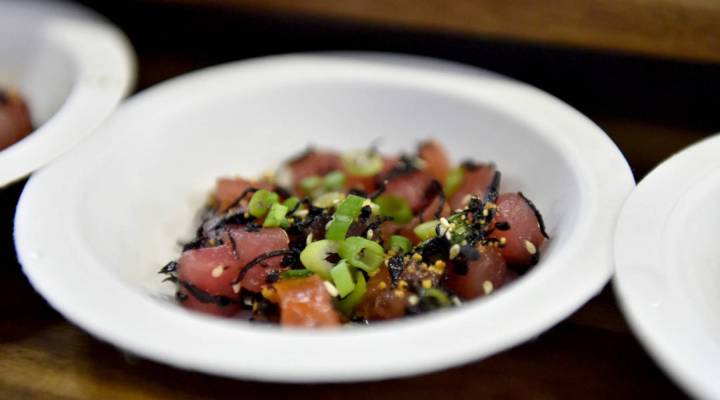
Can you copyright another group’s language?

There is a large body of law in the U.S. geared toward protecting the commercial value of ideas, brands and phrases. Think patents and trademarks. But that law was, for the most part, not designed to protect cultural value. And sometimes the two clash.
Disney, for example, trademarked the Swahili phrase “hakuna matata” 24 years ago when the “Lion King” came out. There’s now an online petition, started by Zimbabwean activist Shelton Mpala, demanding Disney release its rights. Closer to home, a Chicago-based restaurant chain called Aloha Poke Co. filed a trademark for the words “Aloha” and “Aloha Poke.” Businesses from Alaska to Hawaii got cease-and-desist letters and phone calls saying they needed to stop using those words in the names of their businesses. That has sparked outrage and protests from both business owners and Hawaiians.
Sari Sharoni, an associate at the law firm Covington & Burling, joined us to discuss the controversy and whether groups can legally prevent others from appropriating their language.
Sabri Ben-Achour: I want to first make sure that we understand why trademarking a term like “Aloha” or “Aloha Poke” upset so many people.
Sharoni: It’s because it removes it from other people’s potential uses of it, including indigenous groups for whom that term doesn’t have an inherently commercial meaning, but it has some kind of cultural value. It could be religious, it could have to do with cultural rituals and rites. So it prevents them from making certain uses of a word from their own culture.
Ben-Achour: On the other hand, I was looking up different brands that exist out there and you have things like Thirsty Buddha Coconut Water or St. Augustine Distillery. Culture seems to infuse brands because I assume businesses, you know, exist within culture. So is this different from trademarking something like Thirsty Buddha Coconut Water?
Sharoni: It is really context dependent. There are plenty of cultural groups, Native American and otherwise, that register their terms, symbols, could even be music for trademark protection so that they could continue to use those terms in commerce and they could prevent people from outside of that group from using those terms.
Ben-Achour: Well, that brings up the question of: Is there any legal recourse for a group or a tribe to prevent their language from being essentially appropriated in this way?
Sharoni: Yes, so they could register their terms and then use them in commerce. But for some things it just doesn’t make sense, like in the case of the Zia Sun that was a really long running trademark dispute.
Ben-Achour: The Zia Sun is a Native American, sort of rising sun symbol.
Sharoni: It’s a symbol; it appears on the flag of New Mexico. But few people actually know it comes from the Zia Pueblo Native American community. And that sun has appeared on port-a-potties, license plates. And for the Zia people, it has a significant religious meaning. So had they registered it, they would have been able, potentially, to prevent those third-party uses. But there’s some tension there because they don’t want to use the Zia Sun in commerce. They want to use it for exclusively religious purposes. So that’s where the tension with trademark comes into play, because trademark is really meant to promote the use of something in commerce.
There’s a lot happening in the world. Through it all, Marketplace is here for you.
You rely on Marketplace to break down the world’s events and tell you how it affects you in a fact-based, approachable way. We rely on your financial support to keep making that possible.
Your donation today powers the independent journalism that you rely on. For just $5/month, you can help sustain Marketplace so we can keep reporting on the things that matter to you.












